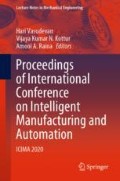Abstract
Trust is an obligatory requirement for each supply chain (SC), as it can greatly improve the overall SC performance. Evaluation of trust among SC actors is not an easy task, but it is essentially needed to take crucial SC decisions. To this point in time, many researchers have attempted to evaluate trust through different perspectives. The purpose of this work is primarily to review the various perspectives of researchers in evaluating SC trust. This paper particularly targets the trust in buyer–supplier relationship. Review reveals that researchers mainly adopt two approaches in evaluating trust, which are survey based and mathematical model based. Benevolence, credibility, ability, integrity, goodwill, and openness are the key trust factors considered by most of the researchers.
Access this chapter
Tax calculation will be finalised at checkout
Purchases are for personal use only
References
Anderson JC, Narus JA (1990) A model of distributor firm and manufacturer firm working partnerships. J Mark 54(1):42–58
Zhuo X, Dai F (2010) Dynamic quantitative trust assessment model between partner-enterprises of supply chain alliances. In: ICLEM 2010: logistics for sustained economic development: infrastructure, information, integration, pp 4582–4589
Kwon IWG, Suh T (2004) Factors affecting the level of trust and commitment in supply chain relationships. J Supply Chain Manage 40(1):4–14
Hossain SA, Ouzrout Y (2012) Trust model simulation for supply chain management. In: 2012 15th International conference on computer and information technology (ICCIT), pp 376–383
McEvily B, Tortoriello M (2011) Measuring trust in organisational research: review and recommendations. J Trust Res 1(1):23–63
Handfield RB, Bechtel C (2002) The role of trust and relationship structure in improving supply chain responsiveness. Ind Mark Manage 31(4):367–382
Xiong L, Liu L (2002) PeerTrust: A trust mechanism for an open peer-to-peer information system. Georgia Institute of Technology
Wang Y, Varadharajan V (2004) Interaction trust evaluation in decentralized environments. In: International conference on electronic commerce and web technologies. Springer, Berlin, Heidelberg, pp 44–153
Lin FR, Sung YW, Lo YP (2005) Effects of trust mechanisms on supply-chain performance: a multi-agent simulation study. Int J Electron Commer 9(4):9–112
Esmaili S, Makui A, Hafezalkotob A (2014) Introducing a mathematical model in supply chain by adding trust flow. J Ind Syst Eng 7(1):80–103
Batt PJ (2003) Building trust between growers and market agents. Supply Chain Manage Int J 8(1):65–78
Sahay BS (2003) Understanding trust in supply chain relationships. Ind Manage Data Syst 103(8):553–563
Ping W, Jing Q (2007) A mathematical trust model in e-commerce. In: 2007 International conference on multimedia and ubiquitous engineering (MUE’07), pp 644–649
Ghosh A, Fedorowicz J (2008) The role of trust in supply chain governance. Bus Process Manage J 14(4):453–470
Panayides PM, Lun YV (2009) The impact of trust on innovativeness and supply chain performance. Int J Prod Econ 122(1):35–46
Doney PM, Cannon JP (1997) An examination of the nature of trust in buyer–seller relationships. J Mark 61(2):35–51
Laeequddin M, Sahay BS, Sahay V, Abdul Waheed K (2010) Measuring trust in supply chain partners’ relationships. Measuring Bus Excellence 14(3):53–69
Jones SL, Fawcett SE, Fawcett AM, Wallin C (2010) Benchmarking trust signals in supply chain alliances: moving toward a robust measure of trust. Benchmarking Int J 17(5):705–727
Cerri S (2012) Exploring factor affecting trust and relationship quality in a supply chain context. J Bus Stud Q 4(1):74
Husseini ZM, Zarandi MF, Husseini SM (2015) Trust evaluation for buyer-supplier relationship concerning fuzzy approach. In: 2015 Annual conference of the North american fuzzy information processing society (nafips) held jointly with 2015 5th world conference on soft computing (WConSC), pp 1–6
Han G, Dong M (2015) Trust-embedded coordination in supply chain information sharing. Int J Prod Res 53(18):5624–5639
Cho JH, Chan K, Adali S (2015) A survey on trust modeling. ACM Comput Surv (CSUR) 48(2):1–40
Özer Ö, Zheng Y (2017) Establishing trust and trustworthiness for supply chain information sharing. In: Handbook of information exchange in supply chain management. Springer, Cham, pp 287–312
Xia J, Yongjun L (2017) Trust evaluation model for supply chain enterprises under blockchain environment. In: 2017 7th International conference on social network, communication and education (SNCE 2017). Atlantis Press
Rehman SU, Qingren C, Weiming G (2017) Rise in level of trust and trustworthiness with trust building measures: a mathematical model. J Model Manage 12(3):349–363
Ruel S, Shaaban S, Wu J (2018) Factors which influence trust in supply chains. Logistique Manage 26(1):58–69
Cofta P (2019) Trust, choice, and self-preservation: a computational approach. Cogn Technol Work, pp 1–17
Mansouribakvand G (2019) The impact of blockchain technology on trust in the supply chain. M.S. thesis, Engineering Logistics, Lund University, Sweden, June 2019. Accessed on 28 Sept 2019. [Online]. https://lup.lub.lu.se/student-papers/search/publication/8987756
Author information
Authors and Affiliations
Corresponding author
Editor information
Editors and Affiliations
Rights and permissions
Copyright information
© 2020 Springer Nature Singapore Pte Ltd.
About this paper
Cite this paper
Mathew, M., Sunny, J., Pillai, V. (2020). Review on Perspectives in Supply Chain Trust Evaluation. In: Vasudevan, H., Kottur, V., Raina, A. (eds) Proceedings of International Conference on Intelligent Manufacturing and Automation. Lecture Notes in Mechanical Engineering. Springer, Singapore. https://doi.org/10.1007/978-981-15-4485-9_30
Download citation
DOI: https://doi.org/10.1007/978-981-15-4485-9_30
Published:
Publisher Name: Springer, Singapore
Print ISBN: 978-981-15-4484-2
Online ISBN: 978-981-15-4485-9
eBook Packages: EngineeringEngineering (R0)

